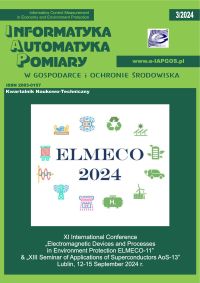[1] Alvarez G., Shujun L.: Some basic cryptographic requirements for chaos-based cryptosystems. International journal of bifurcation and chaos 16(08), 2006, 2129–2151 [https://doi.org/10.1142/S0218127406015970].
DOI: https://doi.org/10.1142/S0218127406015970
[2] Callegati F. et. al.: Traffic Engineering: A Practical Approach. Springer, 2022 [https://doi.org/10.1007/978-3-031-09589-4].
DOI: https://doi.org/10.1007/978-3-031-09589-4
[3] Corinto F. et. al.: Memristor-based chaotic circuit for pseudo-random sequence generators, Proc. of 18th Mediterranean Electrotechnical Conference MELECON 2016, Limassol, Cyprus, 2016 [https://doi.org/10.1109/MELCON.2016.7495319].
DOI: https://doi.org/10.1109/MELCON.2016.7495319
[4] Endo T., Yokota J.: Generation of White Noise by Using Chaos in Practical Phase-Locked Loop Integrated Circuit Module. IEEE International Symposium on Circuits and Systems ISCAS, New Orleans, LA, USA 2007, 201–204 [https://doi.org/10.1109/ISCAS.2007.378311].
DOI: https://doi.org/10.1109/ISCAS.2007.378311
[5] Garasym O. et. al.: How useful randomness for cryptography can emerge from multicore-implemented complex networks of chaotic maps. Journal of Difference Equations and Applications 23(5), 2017, 821–859 [https://doi.org/10.1080/10236198.2017.1287176].
DOI: https://doi.org/10.1080/10236198.2017.1287176
[6] Garasym O. et. al.: New Nonlinear CPRNG Based on Tent and Logistic Maps. Complex Systems and Networks. Lü J. et. al. (ed.): Understanding Complex Systems. Springer 2016 [https://doi.org/10.1007/978-3-662-47824-0_6].
DOI: https://doi.org/10.1007/978-3-662-47824-0_6
[7] Garasym O. et. al.: Robust PRNG based on homogeneously distributed chaotic dynamics. Journal of Physics: Conference Series 692(1), 2016 [https://doi.org/10.1088/1742-6596/692/1/012011].
DOI: https://doi.org/10.1088/1742-6596/692/1/012011
[8] Haliuk S. et. al.: Circuit implementation of Lozi ring-coupled map. Proc. of 4th International Scientific-Practical Conference Problems of Infocommunications. Science and Technology, Kharkiv, 2017, 249–252 [https://doi.org/10.1109/INFOCOMMST.2017.8246390].
DOI: https://doi.org/10.1109/INFOCOMMST.2017.8246390
[9] Kocarev L. et. al.: Chaos-Based Cryptography Theory, Algorithms and Applications. Springer 2011 [https://doi.org/10.1007/978-3-642-20542-2].
DOI: https://doi.org/10.1007/978-3-642-20542-2
[10] Krulikovskyi O. et. al.: PRNG based on modified Tratas chaotic system. Modern information security 2, 2016, 69–77 [http://nbuv.gov.ua/UJRN/szi_2016_2_12].
[11] Krulikovskyi O. et. al.: Testing timeseries ring-coupled map generated by on FPGA. Telecomunication and Informative Techologies 4, 2016, 24–29.
[12] Krulikovskyi O., Haliuk S.: Periodicity of Timeseries Generated by Logistic Map. Part I. Security of Infocommunication Systems and Internet of Things 1(2), 2023, 02010 [https://doi.org/10.31861/sisiot2023.2.02010].
DOI: https://doi.org/10.31861/sisiot2023.2.02010
[13] Lozi R.: Survey of Recent Applications of the Chaotic Lozi Map. Algorithms 16(491), 2023 [https://doi.org/10.3390/a16100491].
DOI: https://doi.org/10.3390/a16100491
[14] Machicao J., Bruno O. M.: Improving the pseudo-randomness properties of chaotic maps using deep-zoom. Chaos 27(5), 2017, 053116 [https://doi.org/10.1063/1.4983836].
DOI: https://doi.org/10.1063/1.4983836
[15] National Institute of Standards and Technology. A Statistical Test Suite for Random and Pseudorandom Number Generators for Cryptographic Applications, NIST Spec. Publication 800-22, Rev. 1a, 2010.
[16] Rodriguez-Vazquez A. et. al.: Chaos from Switched-Capacitor Circuits: Discrete Maps, Proc. of the IEEE, Special Issue on Chaotic Systems 75(8), 1987, 1090–1106 [https://doi.org/10.1109/PROC.1987.13852].
DOI: https://doi.org/10.1109/PROC.1987.13852
[17] Shujun L. et. al.: On the dynamical degradation of digital piecewise linear chaotic maps. International journal of Bifurcation and Chaos 5(10), 2005, 3119–3151 [https://doi.org/10.1142/S0218127405014052].
DOI: https://doi.org/10.1142/S0218127405014052
[18] The Marsaglia Random Number CDROM including the Diehard Battery of Tests of Randomness (accessed: 19.03.2024) [https://web.archive.org/web/20160125103112/http://stat.fsu.edu/pub/diehard/].
[19] Vázquez-Medina R. et. al.: Design of chaotic analog noise generators with logistic map and MOS QT circuits. Chaos, Solitons & Fractals 40(4), 2009, 1779–1793 [https://doi.org/10.1016/j.chaos.2007.09.088].
DOI: https://doi.org/10.1016/j.chaos.2007.09.088
[20] Wang X. et. al.: A New Four-Dimensional Chaotic System and its Circuit Implementation. Frontiers in Physics 10, 2022 [https://doi.org/10.3389/fphy.2022.906138].
DOI: https://doi.org/10.3389/fphy.2022.906138
[21] Wang Z., Liu S.: Design and Implementation of Simplified Symmetry Chaotic Circuit. Symmetry 14, 2022, 2299 [https://doi.org/10.3390/sym14112299].
DOI: https://doi.org/10.3390/sym14112299







